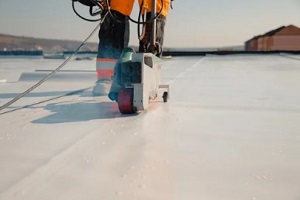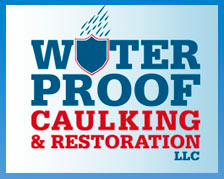 Commercial properties in Pennsylvania regularly see damage caused by moisture and water intrusion. Thanks to the feet of snow that piles up against buildings in the winter and the heavy rains that bombard the structure during the spring and summer, there is little reprieve throughout the year for commercial properties in the state. Because of this, it is wise to invest in commercial waterproofing services.
Commercial properties in Pennsylvania regularly see damage caused by moisture and water intrusion. Thanks to the feet of snow that piles up against buildings in the winter and the heavy rains that bombard the structure during the spring and summer, there is little reprieve throughout the year for commercial properties in the state. Because of this, it is wise to invest in commercial waterproofing services.
While these can be done at the same time that the building is constructed, it is never too late to get started on waterproofing your commercial structure. Waterproofing keeps water from intruding through the exterior of the building. This is useful so that workers, visitors, and others do not have to deal with wet spots and unsightly stains, but it also serves another purpose—increasing property value.
By investing in waterproofing, building owners can see a significant return on investment when their property value rises as a result. Here are some of the reasons why commercial waterproofing in Pennsylvania results in higher property values.
Prevention of Expensive Repairs
The biggest threat associated with non-waterproofed buildings is damage to the structures supporting the building. Especially in Pennsylvania, the weather contributes to a yearly freeze-thaw cycle. When water seeps into porous substances like brick or through compromised mortar between stones, it is slow to evaporate.
If this water freezes, it will expand, as ice does. This expansion pushes the building materials apart, causing cracks, flaking, and crumbling. Then, the ice thaws, and a bigger hole is available—into which more water seeps. When this freezes, it expands even larger, creating a bigger hole, and the cycle repeats.
Waterproofing prevents this water from getting into the building in the first place. Without the need for expensive repairs, business owners can keep more money in their own pockets and avoid degradation of their property and its value.
As many as 20% of insurance claims each year come from water damage in Pennsylvania, and preventing this harm keeps the property in good condition and avoids higher insurance premiums later.
Health Safety and Sale Penalties
Gradual destruction of brick and wood are not the only problems that water can cause. Without waterproofing, moisture in the form of humidity can cling to the backs of interior walls. It takes only 24 to 48 hours for mold and mildew to form, which means that a commercial building is wise to waterproof as soon as possible.
Once mold has formed, its spores can travel through the HVAC system, spraying throughout the building. This might present as minor allergy symptoms for some, but black mold can be hazardous to human health.
A commercial building is also vulnerable to gradual rot and decomposition of walls that are impacted by mold and moisture. If you intend to sell your commercial property in the future, declaring a mold issue will dramatically reduce the property value, because the new owners will need to invest in remediation. Waterproofing can prevent this problem.
Aesthetic Details
Moisture causes visible problems in commercial buildings. You may notice stains on your ceiling tiles or warping in your wallpaper. These reduce property value and discourage new buyers from investing confidently in your structure—if you did not address water problems, what other issues could be lurking just underneath the surface?
Waterproofing is a simple solution to avoid moisture damage throughout the building. This keeps your interior spotless and free from unsightly blemishes, resulting in a higher sale price.
Future-Proofing and Reliability
Some investments are worth more simply because they are what buyers are looking for. Commercial properties sell for a higher price when buyers know that the structure has been waterproofed. That is one less thing they need to invest in, and they can buy confidently, knowing that water damage is not likely within the areas that they cannot inspect.
This commitment to future reliability boosts property value and can even decrease insurance costs, because insurers may view structures that have been waterproofed as lower risk. Thus, waterproofing a commercial building in Pennsylvania is a long-term investment that pays dividends over the life of the structure.
Get Commercial Waterproofing from the Pros
Whether you would simply like to care for your building comprehensively or you are interested in selling your commercial structure at some point in the future, investing in PA commercial waterproofing is a smart choice. It can be done at any time, whether during construction or afterward, and it protects against moisture intrusion while still allowing for dampness within the building to escape.
The experts at Waterproof Caulking & Restoration have waterproofed dozens of commercial buildings in Pennsylvania. Contact us to schedule an appointment so that we can offer a personalized strategy that suits your building’s unique needs.
